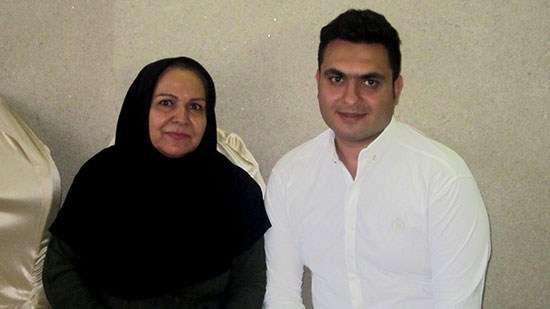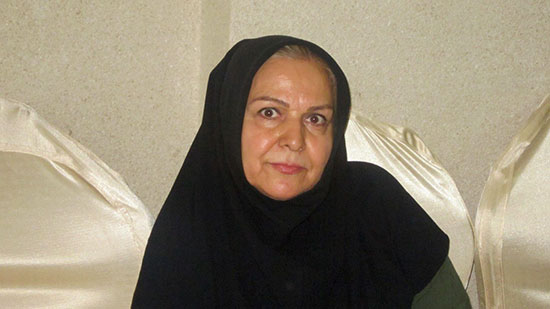Mehri Fallahi writes “Terrestrial Angels”
Interviewed by: Pooya Semsarilar
Translated by: Natalie Haghverdian
2015-08-01
Note: We met Mehri Fallahi, a nurse who provided valuable services during the Holy Defense years to the wounded and gave us the honor of an interview to talk about her memories.
Ms. Fallahi, we are happy to be here. We want to have an interview different from what you’ve experienced before which coincides with the anniversary of establishment of Blood Transfusion Organization (Sazman-e Enteghal-e Khoon-e Iran). Traditionally, interviews start with you introducing yourself.
I’m grateful that you’ve given me this opportunity.
I’m Mehri Fallahi, and I’ve a degree in nursing from Abadan University (Naft University). I was graduated in 1979. Until the war started I lived in Abadan and got married there and gave birth to 3 sons named Mohsen, Majid and Reza.
You are one of the women who went to the fronts. How old were you back then?
I was 21 when I was graduated and since I was living in Abadan I went to the fronts from there.
Did your family have any involvement in such activities or in the Revolution?
Yes. My brother Masoud Fallahi was very active during revolution. My brother and I were active together until Imam Khomeini came to the country. My father was activist in 1953 and spent a year in prison.
Then, you were part of the revolution. When the first sparks did came to your mind that you can go to the war to defend your country and how long was that the war had started?
Since I was working in Naft Hospital, since the beginning of war I felt that I can be effective. I was living in the area and I could feel the war. I was dispatched as a volunteer and I tried to serve my country. I had couple of holidays but I would return quickly.
Were you worried to be in the fronts as a woman?
No. First of all, it wasn’t only me. Many of my classmates were with me. My only motivation was to serve those who were defending my country against ordnance and mortar and take care of them if need be.

Mehri Fallahi and her son who was with her in battlefield
What did your family think about your presence in war? Did they confront you?
No, they didn’t confront me; even when I was pregnant. However, my husband would express worry but he wouldn’t oppose. He knew I wanted to be of help. However, my father encouraged me and would insist that we all have to be in the field. He believed in me.
How long and where did you serve most?
I was in the field for 58 months in turn overs. I was one month in the field and one month off. Since my husband lived in Tehran, I would spend my off months in Tehran. When I gave birth to my son I couldn’t go back for one year; when my child was older I returned to Abadan and started again. I served in Mahshahr, Masjed Soleyman and Aghajari.
When you went to the field and experienced it closely, was it different from what you had in mind? Did you regret your decision?
No one there regretted. But since you mentioned different I should say it was very different. Since the battle field was filled with the sound of mortar bombs and the wounded. The feeling that people would risk their lives to defend their country would shake your heart. The soldiers were competing to go to the front. It would really affect your feelings to see the soldiers sacrificing their lives. Now that I’m recounting it the images are revoked. There, all we thought about was to help one another. It was difficult but we had accepted it.

Indeed, there were other women. What was women’s responsibility?
We were a group of 30 who all worked in the hospital. For example Ms. Shahbazi – Kasebi – Tayebi – Lak – Raisi who would serve in turns in the clinics and field hospitals. When there was an attack, we had many wounded, who needed nursing, stitches and treatment. We used to work in our fields of expertise. Those colleagues who were older would nurse the soldiers like a mother or sister or brother. It is impossible to describe the beauty of it. This would encourage the solders to confront enemies.
One of the topics for today is blood transfusion and I’m sure you have the experience in the fronts. Tell us about it.
When someone is injured or has an accident and suffers loss of blood, his hemoglobin rate drops and blood transfusion is necessary. Severe drop of hemoglobin results in death. There were many cases in the field. During special operations we had a lot of wounded and in need of blood supply. Multiple attacks would block the road and blood had to be transferred from hospital blood bank. Sometimes the bank was short of blood and we needed neighboring cities to supply blood but road block and insecurity would restrict our access. We tried to volunteers at these desperate moments. I have a memory that I would like to share. Once two wounded came in. One was an Iraqi hostage and the other an Iranian soldier.
The Iranian soldier was wounded in the head and the Iraqi hostage needed surgery in the leg. They both needed blood. I was sent to fetch blood from the bank but we were out of supplies. I had to do something. They were both in danger. I thought to myself: why not start with myself. I volunteered to donate blood. They took 250cc. The surgeon asked: who shall receive it. I figured what we do is not about race, religion or nationality so we gave each of them 125 cc. They survived.
What are the conditions to donate blood?
There a no conditions. Every volunteer can do that but they shouldn’t be affected by diabetics, hepatitis and infectious diseases. Blood transfers many diseases. It is good for the donor. It reduces blood concentration.
You probably have many memories. Tell us one that you remember right now?
One night in the hospital, two army soldiers came in with poisoning. After couple of hours, three uniforms came in and asked: have you accepted anyone within last couple of hours? I had this sick feeling that something was wrong so I said: no. Tell their names and I might be able to help. But they ignored me and searched every room and exited from the back door. They didn’t come back. I informed the hospital security and they asked me to describe the uniforms and what they wanted. When I explained they said that those were Iraqi troops and it is the will of God that I’m still alive. I said that I had the feeling that they were fifth column. The security guards said that: they had assassination plan. I said: we don’t have a high profile patient but the guard said: one of those patients is the commander of Ghouchan troops and the other is his body guard. They have the plan to break the blockade of Abadan, so those who came in were on mission to kill them. I was transferred to Tehran that night. Couple of days later I learned that the blockade was gone and Abadan was freed.
Ms. Fallahi, were you injured during your service in the fronts?
It is a very good question. Yes, one day when I was returning home a mortar bomb hit my leg. The mark is still there and will always be with me.
What do you do now? Are you working in any field?
It is two years that I’ve retired from Naft clinic. I’ve tried to keep busy by writing and I have a book of my memories of war and in case Production Support Council reviews and accepts it I shall name it “Terrestrial Angles”. The title is for those nurses who would take care of the soldiers like angles. I hope to publish it soon.
Ms. Fallahi, if you go back, will you recant your decision?
I wish that war doesn’t strike anywhere in the world, especially in Iran. No. my decision won’t change. I don’t regret my decision and in case there is any such problem I will volunteer to help my country again.
Anything else?
Thank you for the opportunity to tell my story. I should thank my family because they believe what I do is sacred.
Persian Source
Number of Visits: 7453
http://oral-history.ir/?page=post&id=5483
